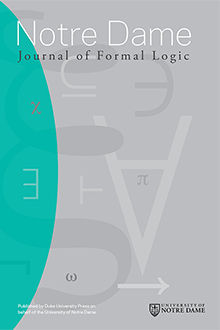Abstract
Neo-Fregean approaches to set theory, following Frege, have it that sets are the extensions of concepts, where concepts are the values of second-order variables. The idea is that, given a second-order entity , there may be an object , which is the extension of X. Other writers have also claimed a similar relationship between second-order logic and set theory, where sets arise from pluralities.
This paper considers two interpretations of second-order logic—as being either extensional or intensional—and whether either is more appropriate for this approach to the foundations of set theory. Although there seems to be a case for the extensional interpretation resulting from modal considerations, I show how there is no obstacle to starting with an intensional second-order logic. I do so by showing how the operator can have the effect of “extensionalizing” intensional second-order entities.
Citation
Jonathan Payne. "Extensionalizing Intensional Second-Order Logic." Notre Dame J. Formal Logic 56 (1) 243 - 261, 2015. https://doi.org/10.1215/00294527-2835092
Information





